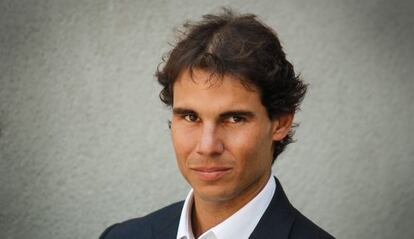“All those moments of suffering are converted into strength”
Tennis world number one Rafael Nadal reflects on a year of injury and victory

Rafael Nadal began 2013 with a left knee injury and ended it as the world's top player after adding two more titles to his list of 13 Grand Slam victories. Meanwhile, his colleagues voted him best Spanish athlete of the year. The 27-year-old "King of Clay" now analyzes what he expects from 2014, a year that will pose one major challenge named Novak Djokovic.
Question. What was going on inside your head in December 2012?
Answer. Doubts. I didn't know when I would make it back.
Q. And what's going on inside it now?
A. Doubts, because I don't know how things will go for me in 2014.
Q. Always doubts.
A. Always doubts. Self-assurance is a synonym for arrogance. One cannot be too sure of things in life.
Q. And why should you have any doubts, having won it all?
A. I have doubts about my tennis, my knee, many things. That does not take away the fact that for the last nine years of my career I have been in the top two positions, except 2012 when I only played six months. If I am physically well, I can train well and stay hopeful about my playing... I have to be optimistic and think that things will continue to go well for me. But in the background there is always a tune playing about success not being forever. As the years go by, that little song keeps getting louder. You have to be ready for it. When my turn comes, I will fight it, but a time will come when I will no longer win. It's not the end of the world. I will thank life for everything that has happened to me.
Q. Few people love to compete as much as you do. When you retire...
A. My life was never just about tennis. I enjoy competition, but I also enjoy life without it. I know I will keep competing when I am done with tennis, playing golf or whatever, on a much lower scale. I like enough things outside of tennis to continue being happy and satisfy that itch with other things. I am aware that the adrenalin, that sense of elation, of satisfaction, of nerves, of winning, of emotion... I don't think I will find that in anything else. I will find other emotions, other ambitions that will never be the same thing... but not necessarily worse either. I figure that after I'm done playing, after so many years of travel, I will take a break. I will relax. I will try to do what I haven't done all this time: fish more, go out more on motorboats, play more golf. After that, I know that I will not stay put. I will have ambitions about traveling, new dreams.
Q. How is your rivalry with Federer different from your rivalry with Djokovic?
A. On the level of the tennis, the tactics and the mentality, it is completely different.
Q. Why is that?
A. Against Federer there is a combination of very well-defined, clashing styles. It is interesting for the public: they more or less know what my strategy against him is going to be, and what he is going to try to do. Because we have two very different, clashing styles, each one of us needs to stress his own style in order to bother his rival as much as possible. This, combined with the fact that for many years we have taken turns being numbers one and two, competing for the most important tournaments, has made each of our matches a little more significant. The matches against Djokovic are more dramatic, perhaps physically as well as mentally. We are closer in style and in our understanding of the game, everything is more similar. Our face-offs have been won by whichever one of us was in peak form that day.
Q. How do you value being number one after everything that's happened to you?
A. Being number one or not does not stress me out, because I don't think about it. As the years go by, things get more complicated and you need to be realistic. Let's hope the knee injury continues to get better, but I don't see how that's going to happen. I will always have to be a little careful about it the rest of my life, and take good care of it: my main goal is for my career to be as long as possible, to be competitive as many years as possible.
Q. Brazilian soccer star Ronaldo said his recovery from injury would be an example and an inspiration to others.
A. These are very unpleasant situations. Hopefully they serve to show that there is a way forward afterward. When you are injured, you never see the light. But if you keep your hopes up about finding the light, very often it will come to you. And when it does come, it brings much more satisfaction than before. At first you go train at the gym with no hopes, because what's the point, you think... but then when you win, after all the suffering and the self-doubting, all those moments of suffering turn into power. They are converted into strength.
Tu suscripción se está usando en otro dispositivo
¿Quieres añadir otro usuario a tu suscripción?
Si continúas leyendo en este dispositivo, no se podrá leer en el otro.
FlechaTu suscripción se está usando en otro dispositivo y solo puedes acceder a EL PAÍS desde un dispositivo a la vez.
Si quieres compartir tu cuenta, cambia tu suscripción a la modalidad Premium, así podrás añadir otro usuario. Cada uno accederá con su propia cuenta de email, lo que os permitirá personalizar vuestra experiencia en EL PAÍS.
¿Tienes una suscripción de empresa? Accede aquí para contratar más cuentas.
En el caso de no saber quién está usando tu cuenta, te recomendamos cambiar tu contraseña aquí.
Si decides continuar compartiendo tu cuenta, este mensaje se mostrará en tu dispositivo y en el de la otra persona que está usando tu cuenta de forma indefinida, afectando a tu experiencia de lectura. Puedes consultar aquí los términos y condiciones de la suscripción digital.









































